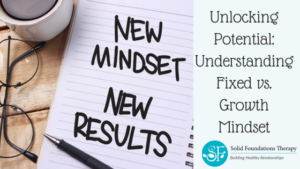
When facing any situation in life, there will be various kinds of barriers that hold people back and various advantages that will propel people forward.
Can you relate?
I know I certainly can!
Some of the factors that determine barriers or advantages are external to people, such as geographical location, socioeconomic status, and access to readily available resources.
However, a big determining factor in barriers or advantages comes down to the mindset one has when facing any situation.
If you go into a job interview and think there is no way you will get the job, you are setting yourself up for failure before you even get the opportunity to sell yourself!
On the other hand, if you go into that same job interview with the mindset that you are going to give it your all, no matter the outcome, you are allowing yourself to feel challenged to accomplish something you may have never achieved without trying.
As you can see, there exists a dichotomy of mindsets, fixed and growth, inside every person you meet. These two contrasting belief systems profoundly shape our perceptions, behaviors, and ultimately, our destinies.
Fixed Mindset: The Trap of Limitation
At the heart of a fixed mindset lies the belief that intelligence, abilities, and talents are innate and immutable traits. Individuals with a fixed mindset view challenges as threats to their inherent capabilities, fearing failure as a reflection of their inadequacy.
They may shy away from challenges, preferring tasks where success is guaranteed, as failure is seen as a confirmation of their limitations.
Moreover, feedback is often met with defensiveness or dismissal, serving as a blow to their self-esteem rather than an opportunity for growth. Individuals with this mindset often live very structured, rigid, lifestyles and find it difficult to stray too much from their comfort zones.
Implications of Fixed Mindset:
The consequences of a fixed mindset are far-reaching, permeating various aspects of an individual’s life.
In academic settings, students with fixed mindsets may underperform when faced with challenging material, opting for tasks where success is guaranteed rather than risk failure.
In the professional sphere, those with fixed mindsets may avoid taking on new responsibilities or seeking out opportunities for advancement, fearing incompetence or rejection.
When it comes to relationships, individuals with fixed mindsets will have rigid expectations of how things “should be” on a day to day basis and will struggle with compromise.
Fostering a Growth Mindset: Cultivating Potential
Despite how uncomfortable letting go of a fixed mindset can be, the journey towards a growth mindset is not insurmountable. Embracing a growth mindset involves recognizing the power of effort, resilience, and perseverance in achieving success.
So how does one acquire a growth mindset?

Here are some practical strategies for fostering a growth mindset:
- Embrace Challenges: Rather than shying away from obstacles, view them as opportunities for growth and learning. Approach challenges with a sense of curiosity and determination, recognizing that setbacks are an integral part of the journey towards mastery.
- Emphasize Effort: Shift the focus from innate abilities to the power of effort and hard work. Celebrate persistence and resilience, acknowledging that progress is achieved through dedication and practice.
- Learn from Failure: Instead of viewing failure as a reflection of incompetence, reframe it as a stepping stone towards improvement. Learn lessons from setbacks, and use them as fuel for future growth and development. When someone fails, it just means it was their First Attempt In Learning.
- Cultivate a Growth-Oriented Environment: Surround yourself with individuals who embody a growth mindset, fostering a culture of collaboration, support, and encouragement. Seek out mentors and role models who inspire you to reach new heights.
The distinction between fixed and growth mindsets serves as a powerful lens through which we can understand the intricate interplay between beliefs, behaviors, and outcomes.
While a fixed mindset may erect barriers to progress and fulfillment, a growth mindset unlocks the boundless potential that lies within each of us. A growth mindset also helps us connect and learn better from the people around us; it forces us to get curious about why things happen.
By embracing the power of effort, resilience, curiosity, and lifelong learning, we open the door to self-discovery, empowerment, and experiences we may have never dreamed of.
If you find yourself struggling with your mindset, know that you don’t have to go through it alone. Our therapists at Solid Foundations Therapy are here to help you! Visit our website at www.solidfoundationstherapy.com or give us a call at 630-633-8532 today.

